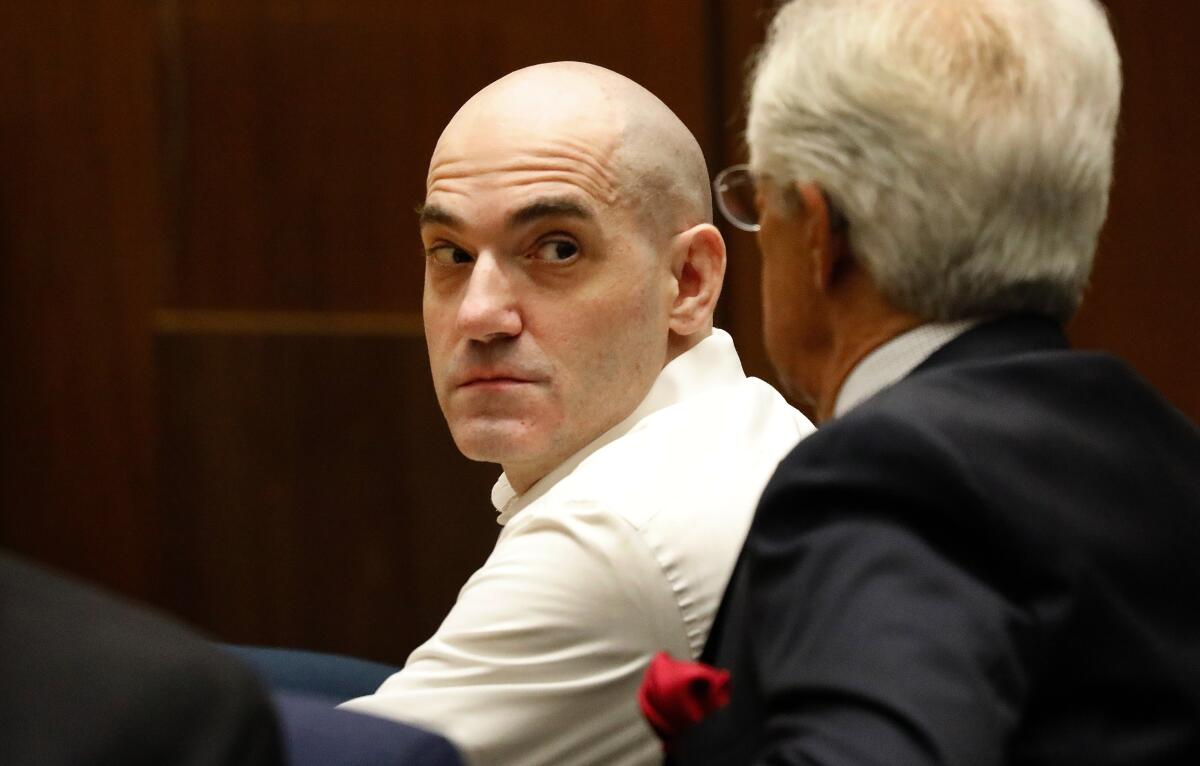Gascón makes exception to death penalty ban for “boy next door” killer

Michael Gargiulo, who was convicted in 2019 of killing two women and seriously injuring another in a series of knife attacks, will still face the death penalty after Los Angeles County Dist. Atty. George Gascón made an exception to his order barring capital punishment, according to court documents filed this week.
When he took office last year, Gascón enacted a number of sweeping policy changes, including directives that barred prosecutors from seeking the death penalty or making use of the sentencing enhancements state law allows in certain types of cases that can significantly increase the time someone spends in prison.
But in the Gargiulo case, Gascón said he would not order “the trial lawyers to adopt his policy regarding the death penalty and does not order them to ask for dismissal of the death penalty jury verdict,” according to a memo Gascon filed in court this week.
In the same filing, however, Gascón also ordered prosecutors to read a statement which notes the district attorney “does not believe the death penalty is an appropriate punishment in any case,” and asks the judge to consider his opposition to capital punishment before he sentences Gargiulo later this year.
Alex Bastian, a special advisor to Gascón, said Friday the move did not represent a change in policy but rather a rare exception necessitated by a complicated legal situation. Gargiulo was convicted while former Dist. Atty. Jackie Lacey was still in office, but his sentencing hearing has been delayed by a number of post-conviction hearings and the courthouse backlog caused by the COVID-19 pandemic.
Bastian said that although Gascón’s opposition to the death penalty remains firm, he concluded he needed to defer to the recommendation made by the jury in Gargiulo’s case that he should be put to death.
“What’s also important to our office is to ensure that whatever way we proceed does not revictimize the family through additional litigation,” he said. “As a result, we are balancing all of those factors in how we are proceeding with this case.”
Gascon’s decision to relent has little practical impact on the case because Gov. Gavin Newsom placed a moratorium on executions in California in 2019.
Nonetheless, Gargiulo’s defense attorney Dale Rubin said Gascón’s move violates his client’s constitutional rights, since the district attorney’s office has taken the death penalty off the table in other murder cases in recent weeks.
The double standard, Rubin said, runs afoul of the equal protection clause in the Constitution. He said he is planning to file a motion to recuse the Los Angeles County district attorney’s office from the case.
Prosecutors did not respond to Rubin’s arguments during a brief hearing in a downtown courtroom on Friday. A sentencing hearing has been set for July.
Bastian declined to respond to Rubin’s comments until he files his motion to recuse. He did note that there is another death penalty case in L.A. County where a verdict was rendered during Lacey’s tenure that could trigger a similar situation.
In all, there are 16 death penalty defendants with active cases in L.A. County, records show. Fourteen of those defendants cases have not gone to trial yet, according to Bastian, meaning Gascón will in all likelihood order prosecutors not to seek the death penalty in those cases.
The move by Gascón was surprising following his first two months in office, in which he has taken an absolutist approach on reforms that opponents have said fail to take into account the particular details of individual cases.
Since taking office in December, Gascón has backpedaled on some other reforms as well. After receiving severe pushback from prosecutors, judges and some victims rights’ advocates on his policy barring sentencing enhancements, Gascón relented somewhat to allow enhancements to be filed in cases involving hate crimes, sex assaults and attacks on children.
A jury decided in October 2019 that Gargiulo should be put to death after he was convicted of carrying out a series of gruesome attacks on three women over several years. Dubbed the “boy next door” killer by prosecutors because he stalked neighbors, Gargiulo in 2001 stabbed 22-year-old Ashley Ellerin dozens of times before slashing her throat in her apartment. Ellerin had been dating actor Ashton Kutcher at the time.
Four years later, Gargiulo moved to El Monte and killed 32-year-old Maria Bruno, mutilating her body to the point that prosecutors said he “quite literally butchered her.”
Gargiulo was apprehended in 2008 after attacking a third woman, Michelle Murphy. Despite suffering stab wounds, Murphy managed to fight the man off after he broke into her Santa Monica apartment.
Authorities believe his killing spree actually began in a suburb outside of Chicago when he was a teenager. Gargiulo has been linked by DNA to the 1993 killing of 18-year-old Tricia Pacaccio, and he is expected to face trial there after his proceedings in Los Angeles are done.
Gargiulo’s defense attorneys have argued he suffers from severe mental illness after a childhood marked by abuse and neglect, and said he was in a “fugue state” that left him unable to remember anything during the attacks. Jurors, however, determined he was sane at the time of the crimes.
More to Read
Sign up for Essential California
The most important California stories and recommendations in your inbox every morning.
You may occasionally receive promotional content from the Los Angeles Times.











